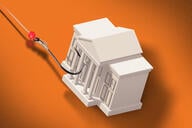You have /5 articles left.
Sign up for a free account or log in.
It’s time for final exams. You’re a student in Tokyo and your professor works in Alabama. It’s after midnight and you’re ready to take the test from your bedroom. No problem. Flip open your laptop, plug in special hardware, take a fingerprint, answer the questions and you’re good to go.
Just know this: Your professor can watch your every move ... and see the pile of laundry building up in the corner of the room.
Distance learning programs – no matter their structure or locations – have always wrestled with the issue of student authentication. How do you verify that the person who signed up for a class is the one taking the test if that student is hundreds, often thousands, of miles away?
Human oversight, in the form of proctors who administer exams from a variety of places, has long been the solution. But for some of the larger distance education programs -- such as Troy University, with about 17,000 eCampus students in 13 time zones -- finding willing proctors and centralized testing locations has become cumbersome.
New hardware being developed for Troy would allow faculty members to monitor online test takers and give students the freedom to take the exam anywhere and at any time. In principle, it is intended to defend against cheating. But some say the technology is going overboard.
Sallie Johnson, director of instructional design and education technologies for Troy’s eCampus, approached Cambridge, Mass.-based Software Secure Inc. less than two years ago to develop a unit that would eliminate the need for a human proctor. Johnson said the hardware is the university’s response to the urgings of both Congress and regional accrediting boards to make authentication a priority.
The product, called Securexam Remote Proctor, would likely cost students about $200. The unit hooks into a USB port and does not contain the student’s personal information, allowing people to share the product. The authentication is done through a server, so once a student is in the database, he or she can take an exam from any computer that is hardware compatible.
A fingerprint sensor is built into the base of the remote proctor, and professors can choose when and how often they want students to identify themselves during the test, Johnson said. In the prototype, a small camera with 360-degree-view capabilities is attached to the base of the unit. Real-time audio and video is taken from the test taker's room, and any unusual activity -- another person walking into the room, an unfamiliar voice speaking -- leads to a red-flag message that something might be awry.
Professors need not watch students taking the test live; they can view the streaming audio or video at any time.
“We can see them and hear them, periodically do a thumb print and have voice verification,” Johnson said. “This allows faculty members to have total control over their exams.”
Douglas Winneg, president of Software Secure, said the new hardware is the first the company has developed with the distance learning market in mind. It has developed software tools that filter material so that students taking tests can’t access any unauthorized material.
Winneg, whose company works with a range of colleges, said authentication is “a painful issue for institutions, both traditional brick-and-mortar schools and distance learning programs.”
Troy is conducting beta tests of the product at its home campus. Johnson said by next spring, the Securexam Remote Proctor could commonly be used in distance learning classes at the university, with the eventual expectation that it will be mandatory for students enrolled in eCampus classes.
When Troy unveiled the unit last winter at the Southern Association of Colleges and Schools meeting in Atlanta, dozens of college officials expressed an interest in participating in beta testing. (Johnson said she has also received calls from interested parties who would like to use the software to help disabled students).
Susan Aldridge, president of University of Maryland University College, said she would like her college to be one of the first testing sites. Aldridge has first-hand knowledge of the technology -- she was vice chancellor of Troy's University College and eCampus, before coming to UMUC. (Both UMUC and Troy have extensive distance programs all over the world, growing out of their work with students in the military). She said she brought up the idea of a device that hooks into a computer a few years back, but that the cost of fingerprinting hardware was too high.
Aldridge said this technology would go a long way in solving what she calls “a logistical nightmare” involving students, faculty and human proctors.
“The concept is revolutionary for the industry,” Aldridge said. “Authentication is a huge issue in this sector. Coming up with a way to preserve academic integrity is critical. It will continue to be a challenge for any university conducting classes at a distance.”
Brian Douglas, chief technology officer for UMass Online, said the issue of online cheating is overstated. "In my opinion, it doesn’t occur in any greater frequency than in the traditional classroom. This solution seems like quite an intrusion into a student’s life, and you are introducing a technological challenge into an already nerve-wracking testing situation."
Douglas said UMass Online is not considering such a device and has not heard of other colleges proposing a similar product. He said the university relies on the honor code and tries to structure online exams so that it is difficult to cheat.
Rebecca Jeschke, a spokeswoman for Electronic Frontier Foundation, a group concerned with privacy and digital freedom, said she doesn't see a problem with the use of the technology. “It seems like it’s pretty containable. It might feel a little creepy, but at least it's transparent. People make privacy bargains every day; you give up privacy in exchange for convenience."
Johnson said some students at Troy were hesitant about the hardware at first but have warmed up to the idea. For those who say the Securexam Remote Proctor sounds like something out of a George Orwell novel, Johnson has this response: “You don’t have to take an online class. You can always come to our campus. It’s your choice.”




